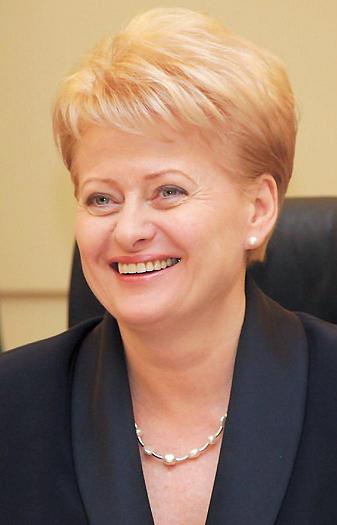The Lithuanian president has voiced safety fears over her neighboring countries’ nuclear power plans, saying one plant will be built “without proper safety assessments, providing no transparency and without sharing information” just 50 kilometers from Lithuania’s capital.
President Dalia Grybauskaite said she would push at the Seoul Nuclear Security Summit for stronger and mandatory international standards for every country developing the technology.
The Eastern European country opposes the construction of what it has called irresponsible nuclear power plant projects in Belarus and the Russian exclave of Kaliningrad.
But both countries said their plans adhered to international safety conventions.
“Today, our biggest concern is the safety of all new nuclear projects in the region,” Grybauskaite said ahead of the Seoul Nuclear Security Summit on Monday and Tuesday.
“The new nuclear projects in Kaliningrad and Belarus, the latter just 50 kilometers from Lithuanian capital Vilnius, are planned without proper safety assessments, providing no transparency and without sharing information.
 |
Lithuanian President Dalia Grybauskaite (Lithuanian government) |
“Since nuclear accidents respect no borders we urge the other countries to participate in building confidence by performing stress tests, appropriate environmental impact assessments and, what is the most important, by sharing all the information and providing the answers to all questions.”
Lithuania is a newcomer to the Nuclear Security Summit, first held in Washington, D.C. in April 2010, and is calling for clear rules for all countries to follow.
“Lithuania proposes to strengthen the international standards of nuclear security and safety by making them obligatory and mandatory to every country which is developing nuclear energy,” Grybauskaite said.
“A nuclear accident in one country may have regional and even global consequences. That’s why we invite everyone to endorse clear and binding rules, norms and standards of nuclear security and safety. And we think that the IAEA must be given a strong and imperative mandate to monitor the implementation of these rules.”
But the Russian Embassy in Seoul said that the country had carried out relevant safety checks and environmental impact assessments on the new Baltic Nuclear Power Plant being built in Kaliningrad, and had shared information with neighboring countries.
“Unfortunately, there is only one country ― Lithuania ― which refuses to accept Russia’s offer to hold official bilateral consultations on the environmental impact assessment of the Baltic NPP. Russia participates and strictly implements provisions of all international conventions on nuclear safety, radiological protection and nuclear security,” he said, adding that Lithuania refused to conduct talks with Russia on its own Visaginas NPP project.
Belarusian Ambassador to Korea Natalia Zhylevich said that her country was party to all relevant international treaties, with the works being checked by the International Atomic Energy Agency.
The country is building a 2,400 megawatt-capacity nuclear power plant near the Lithuanian border, with two reactors expected to be operational within the decade.
“Belarus is a country that has gone through Chernobyl,” she said. “The Belarusian people know very well what a nuclear accident means. This is exactly the reason why security and safety of the nuclear power plant that is under construction in Belarus are matters of utmost importance to the Belarusian Government.”
Lithuania currently has no functioning nuclear power facilities but has carried out the required safety measures for its planned Visaginas plant, Grybauskaite said.
She also said that Lithuania aimed to establish a regional Nuclear Security Center of Excellence to exchange best practice and counter nuclear smuggling.
By Kirsty Taylor
(
kirstyt@heraldcorp.com)








